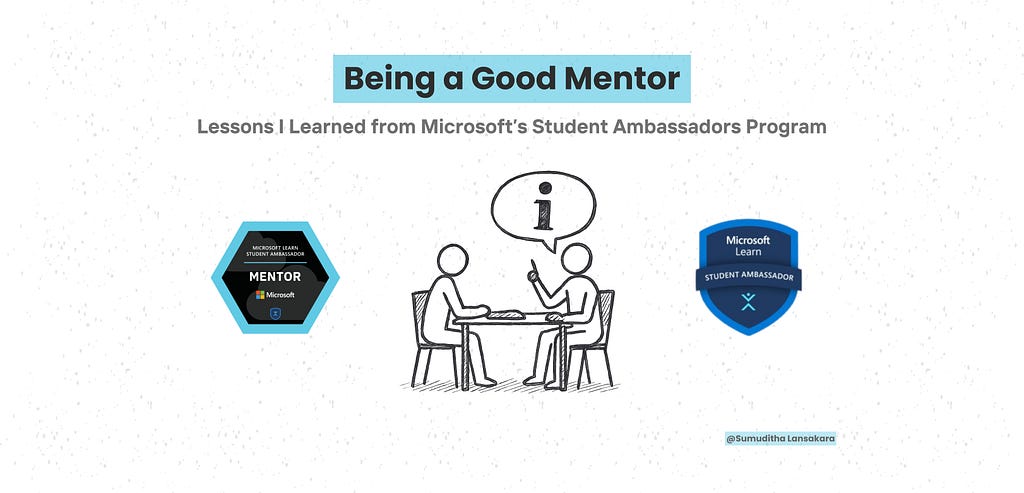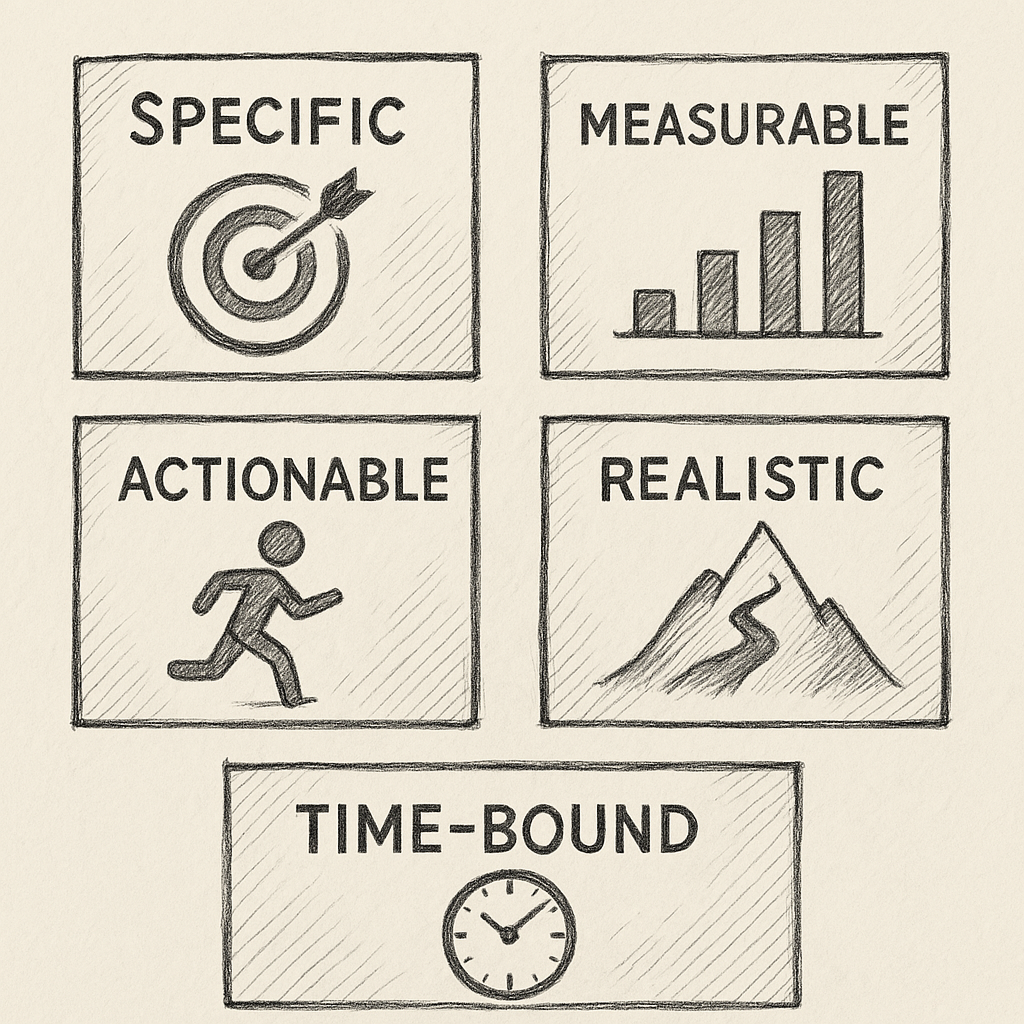Being a Good Mentor: Lessons I Learned from Microsoft’s Student Ambassadors Program
April 12, 2025

This article has been sitting in my drafts for a while. Almost a year ago, I completed the Microsoft Learn Student Ambassadors Mentor program and received my mentor badge. It may look like a digital token, but for me, it represents three meaningful months of guiding others, listening, sharing, and learning how to become a better mentor.
Looking back, those months shaped not just how I supported others — but how I grew myself. If you’re mentoring someone, leading a team, or simply helping people navigate their goals, I hope these lessons resonate with you.
1. Focus on the Person Behind the Role
Mentorship starts long before the advice. It begins with connection.
People are more likely to trust and open up when they feel genuinely seen — not just for what they do, but for who they are. One idea I came across during this journey is the “Law of Similarity”. We naturally connect with those who seem similar to us. But similarity can show up in different ways.
- Surface-level similarity is what we notice first — age, background, where someone studied.
- Deep-level similarity is what really counts — shared values, beliefs, goals, and perspectives.
Building trust comes from understanding what matters to the other person on that deeper level. And that takes time, conversation, and curiosity.

2. Be Honest First — That’s Where Trust Begins
There’s a certain strength in being open. I learned that people respond more honestly when I was willing to share a bit of myself first.
That kind of honesty — called self-disclosure — can feel uncomfortable. But it’s also what creates space for real conversations. When we admit a past mistake, talk about a challenge, or share how we felt during a tough moment, it invites the other person to do the same.
The key is to keep it relevant. Share things that help the conversation, match the other person’s comfort level, and always listen more than you speak. Trust isn’t built through grand speeches — it grows through small moments of honesty.
3. Ask Questions That Spark Reflection
One of the most powerful tools a mentor has is a thoughtful question.
Not every question needs to be deep. It helps to begin with simple ones that make the person feel comfortable. But the goal is to open the door to deeper thinking. Questions like,
- What motivated you to take this path?
- How did that moment make you feel?
- Why do you think that decision worked out the way it did?
These kinds of questions invite reflection and allow people to explore their thoughts, rather than just give answers they think you want to hear.
4. Give Feedback That Helps, Not Hurts
Good feedback can move someone forward. But it’s not just about what you say — it’s how and when you say it.
I found this approach helpful: Start by asking if they’re open to feedback. Then, give them space to reflect first — what do they think went well? What would they do differently? Only after that, I share what I observed — both the positives and the areas that could be better.
Instead of giving all the answers, try to work through possible improvements together. And always end on an encouraging note. Even when feedback is tough, people should leave the conversation feeling hopeful, not defeated.
5. Use Goals That Actually Work
Vague goals don’t get us very far. That’s why I leaned heavily on SMART goals — goals that are,
- Specific — clear and focused
- Measurable — trackable and visible
- Actionable — tied to real steps
- Realistic — achievable
- Time-bound — has a deadline
For example, instead of saying “I want to get better at presenting,” someone might say: “I will deliver three presentations over the next two months and ask for written feedback after each one.”

This turns intention into action — and action leads to progress.
6. Celebrate Progress, Not Just Results
It’s easy to focus on the final outcome and forget about all the effort that led up to it. But I found that the little steps along the way are just as important.
Finishing a small task, speaking up in a meeting, asking a question they were once afraid to ask — these are all moments worth recognizing. Noticing and celebrating these milestones helps people feel valued and motivated to keep going.
7. Emotional Intelligence Makes All the Difference
Being a good mentor isn’t just about knowing things. It’s about understanding people. Emotional intelligence is what allows you to meet someone where they are. This involves three key things,
- Self-awareness — understanding your own strengths, limits, and triggers
- Self-management — staying calm, kind, and composed, especially when things are tense
- Empathy — being able to step into someone else’s shoes and truly understand how they feel
Sometimes, just saying “That sounds like it was really hard for you” can shift the entire tone of a conversation.

8. Keep Showing Up — Even When It’s Tough
There were times when things didn’t go smoothly. People missed meetings, lost motivation, or hit a wall. And yes, there were times when I felt stuck too.
That’s when I learned the importance of grit — the combination of perseverance and passion that keeps you moving forward even when things are challenging.
It helped to look back at past challenges I’d overcome, remind myself and others of why we started, and take one small step forward at a time. Grit doesn’t mean forcing progress. It means staying committed, even when progress is slow.
9. Challenges Will Happen — Handle Them with Care
Mentoring isn’t always perfect. Every relationship comes with its own set of challenges. During my experience, I ran into a few common ones.
When schedules didn’t line up or communication felt off, we had to get clear on expectations. Agreeing on fixed meeting times and using multiple ways to stay in touch helped a lot.
Sometimes the other person seemed disengaged. Instead of making assumptions, I checked in and asked if anything was going on. Often, there was a personal reason behind the silence.
And in rare cases, I had to set firmer boundaries — when there was disrespect or toxic behavior. Mentoring is about support, but it also means protecting your own space when needed.
10. There’s Time for What Matters
One of the most meaningful things I came across during this program was a quote by artist Brian Andreas:
“Everything changed the day she figured out there is exactly enough time for all of the important things in her life.”
That quote still stays with me.
Mentoring can feel like another responsibility in an already full schedule. But when something truly matters, there’s always time. Even a 30-minute call or one thoughtful message can make a huge impact on someone’s journey — and on yours too.
About the Badge
Microsoft Learn Student Ambassadors Mentor
Being a Good Mentor — LinkedIn Learning
Issued by: Microsoft MVP and Student Ambassadors Community
Earned on: May 7, 2024
Program Duration: 3–6 months
Skills developed: Mentorship, Community Building, Leadership
Looking back, I’m proud of this experience — not just because of the badge, but because of what it taught me. I didn’t just help others grow. I grew too.
And if you’ve ever thought about mentoring someone — go for it. You don’t need to be perfect. You just need to be present.